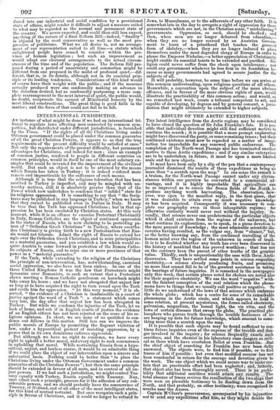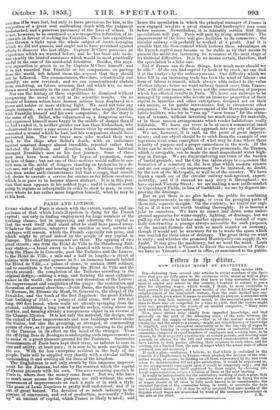RESULTS OF THE ARCTIC EXPEDITIONS.
Tire latest intelligence from the Arctic regions may be considered to have closed the question of Sir John Franklin's fate. It is pos- sible that individual devotion might still find sufficient motive to continue the search; it is possible that a more prompt exploration
might have discovered the party, or some remaining traces; but their continued existence must now be regarded as a matter of imagi- nation too improbable for any renewed public endeavour. The completion of the North-west Passage also has terminated another motive to these Arctic expeditions ; and if any similar enterprises are to be undertaken in future, it must be upon a more limited scale and for new objects.
It must have been only by a slip of the pen that a contemporary
journalist dismissed the results of these expeditions as being no more than " a scratch upon the map." In one sense the remark is a truism, for the North-west Passage cannot under any circum- stances within our purview be converted to a commercial ad- vantage, and it is highly improbable that agriculture' can be so improved as to coerce the frozen fields of the 1+1-44,to produce anything worth harvesting. The observation,Aow- ever, was open to the manifest reply, in the first placeo,.that it was desirable to attain even so much negative knowledge as has been acquired. Consequently it was necessary to com- plete our geography even in those inhospitable regions ; for otherwise curiosity would never rest without the inquiry. Se- condly, that science never can predetermine the particular objects which it shall extricate from the regions of the unknown, _but must continue its explorations, so to speak, in a pious devotion to the mere pursuit of knowledge ; the most admirable scientifliedis- coveries having resulted, as the vulgar say, from "chande,7but, as the better knowing say, from the continued travelling: (;i' the human mind over the region of the unknown in search of ,kentli. It is to be doubted 'whether any truth has ever been discoverettin the history of mankind that has proved worthless ; that has not on the contrary been the parent of other truths of the greatest value. Thirdly, such is unquestionably the case with these Arctic discoveries. They have settled some points in science respeetrng electricity,—a science already producing fruits, and promising us more that cannot filil to be of the greatest assistance in -taking the bearings of future inquiries. It is remarked in the newspapers only this week, that certain places noted for cholera are noted also for their negative electricity. We use the word "negative "with- out the faintest conception of the real relation which the pheno- mena have to things that we usually call positive or negative. So little do we understand of the laws of that science which embraces the whole globe ; which has a centre for some of its remarkable phenomena in the Arctic circle, and which appears to hold in some relation, at present mysterious, the forces called electricity, galvanism, magnetism, the boreal light, the vie vita', and the laws of certain diseases that sweep the globe. The practical phi- losophers who pursue truth through the terrible fastnesses of ice are heaping up data for future knowledge, which amount to some- thing more than a scratch upon the map. It is possible that such objects may be found t-tp don-
tinue future inquiries even at the expense of the trtinh e !VAR- ger involved in the inquiry ; for science frequently ,4apki
sacrifices, and the chemist in his laboratory runs dangers as - cal as those which have overtaken Bellot or even Franklin.' oldlut the chief object of searching for Franklin has now bealidldly answered. The objects were, to find him if possible, or-trfind traces of him if possible : but even that modified successlihasinot been vouchsafed in return for the courage and devotion gitieff 'to the work. The one object which we could secure was to make cer- tain that no practicable effort had been neglected ; and, latter] , that object also has been thoroughly. served. There is no: piti bility that additional sacrifices would attain any result
total absence of traces revives the recollection of the two a'hips were seen on plausible testimony to be floating down from the North, and that probably, on other testimony, were recognized in wreCks near the Azores.
Captain M'Clure's perseverance' accompanied by his injunction not to send any expeditions after him, as they might double the sacrifice if he weretlost, but only to leave provisions for him, is the suggestion of a great soul confronting death with the judgment undisturbed, and a generous parsimony of the lives of others. It is not, however, to be construed as a retrospective refutation of ar- gm:anti in &your of seeking for Franklin. These late expeditions have thrown a light upon the whole subject of Arctic voyaging which we did not possess, and ought not to have presumed against efforts to discover the lost ships. Captain M'Clure possesses an experience which we wanted before, and he has been able to de- fine exactly the kind of assistance which would be most practically useful in the case of his accidental detention. Besides, this nega- tive injunction is given to us by Captain M'Clure himself; and it.is not recorded that Franklin or his companions, on parting from the world, left behind them the request that they should not be followed. The circumstances, therefore, scientifically and morally, are now reversed ; and we can conscientiously abstain from rendering, on future occasion, that aid which was no more thana moral necessity in the case of Franklin.
Nor can the history of these expeditions be dismissed without recognizing the moral as well as the scientific results. On no theatre of human action have human actions been displayed in a purer and nobler or more striking light. We need not take any single instance ; we need not compare those who sought Franklin with Franklin himself and his own companions ; for the story is the same of all. Bellot, who volunteered on a dangerous service, and expressed himself more happy in the middle of danger than if he had evaded it, is neither greater nor less than Richardson, who volunteered to carry a rope across a frozen river by swimming, and concealed a wound which he had, lest his companions should have prevented him. The two brave men who worked their way back to the ships after Bellot's death, with an endurance against oonstant danger almost incredible, repeated rather than imitated the fortitude and devotion which became habitual amongst Franklin's men on his first journey. Some of those men may have been actuated by hopes of promotion, some by love of fame ; but not one of these motives would suffice to sus- tain men in the midst of dangers standing on broken ice in a de- sert sea, out of sight and hearing of any help. Nothing could sus- tail men under such circumstances but that courage, that unself- ish desire to execute a service for science or for fellow creatures, which is so pure as to become almost abstract. It is in this posi- tion that man appears in his noblest type ; and it is almost worth going to regions so inhospitable in order to show to man, in coun- tries where he has rather more forgotten himself, what he may be at his best.



























 Previous page
Previous page